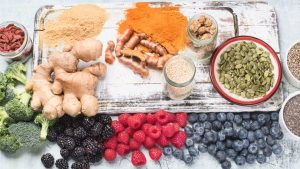Can You Tell if You Have Inflammation?
Hello Everyone. I hope that you are well. This post relates to why Eat Burn Sleep exists.
It was COVID-19 that shed more light on what I have been talking about for a long time.
Scientists quickly recognized which individuals would be vulnerable to catching COVID-19 during the pandemic.
The warning went out to people with pre-existing conditions like autoimmune diseases, diabetes, weight issues/obesity, heart and lung disease, and older age groups most likely to catch COVID-19.
Until the pattern started to deviate.
Why were supposedly healthy young people without any conditions suffering badly and dying from the contraction of COVID-19? Read on to find out.
What Factors Increase the Risk of Getting Viruses?
How Do You Know If You Have Inflammation?
Is There a Test to Check for Inflammation?
How Do You Get Rid of Chronic Inflammation in the Body?
Why Is Gut Microbiota Important?
What Can Alter Gut Health?
Does Being Healthy Make Your Immune System Stronger?

What Factors Increase the Risk of Getting Viruses?
Many scientific studies were undertaken to see the common link between bodies with serious illness (including ‘healthy’ young people) and COVID-19.
Finally! The scientists found that the factor in common that worsened the prognosis and increased complications of COVID-19 was underlying systemic inflammation.
This makes sense because systemic inflammation is linked to obesity and most non-communicable diseases. People with underlying conditions have chronic (systemic) inflammation running through them.
How Do You Know If You Have Inflammation?
It’s imperative to know that inflammation is a dysregulation of the immune system.
We need adequate inflammation to respond to pathogens, viruses, and stimuli since it has always been a fundamental response to threats.
Read more about how the immune system works in my article: How to Boost Your Immunity to Fight Viruses, How to Recover from Virus Infections & Reduce Asthma With an Anti-inflammatory Diet.
Suppose the immune doesn’t succeed in dealing with the pathogen/virus. In that case, it releases a ‘cytokine storm,’ a rapid release of different pro-inflammatory cytokines (protein-based cell signaling molecules). It is this inflammatory storm that many very sick people are vulnerable to, rather than the virus itself.
The issue begins when inflammation is running consistently and destroying healthy tissue.

Now, the ancients characterized inflammation based on visual observation:
- Redness (rubor)
- Swelling (tumor)
- Heat (calor; applicable to body extremities)
- Pain (dolor)
- Loss of function (function laesa)
Certainly, systemic inflammation (chronic inflammation) presents itself to us with apparent signs and conditions like arthritis, colitis, lupus, alopecia, diabetes, obesity, and thyroid issues. Still, inflammation is much more complex than conditions you can ‘observe.’
From the acute to the chronic to the debilitating destruction – and oftentimes, hidden.
Inflammation can run through our vessels, growing into something more significant, without presenting signs and symptoms.

This links the otherwise ‘healthy’ people who suffered greatly and died during COVID-19.
The chronic inflammation was not showing visibly (and when it would, it would depend on many factors).
If there was systemic inflammation rising silently through the body, it made the immune system unable to produce an adequate attack to defend, thus making an otherwise ‘healthy’ person more susceptible to a virus like COVID-19.
There are, of course, genetic predispositions to inflammatory diseases, too, that come into play.
Indeed, this is another reason to assess your lifestyle: lessening the likelihood of activating genetics through eating, living, breathing, moving, resting, stress-busting, sleeping, and thinking in an anti-inflammatory way.
You don’t have to ‘feel’ unwell to consider reducing your inflammation.
Moreover, since chronic inflammation is so prevalent in our lives for an array of reasons, it is wise to combat inflammation before it presents itself into something bigger, sooner or later.

It is wise to prepare and fortify our body’s response to threats.
So, as you can imagine, ‘inflammation’ is now characterized as: ‘The reaction to injury of the living microcirculation and related tissues’ rather than the visual observation of olden times.
Some signs of inflammation may surprise you!
We can have chronic inflammation without knowing it. A silent disease, as such.
Is There a Test to Check for Inflammation?
Unfortunately, no highly effective tests assess whether chronic inflammation is running in your body.
There are several tests that the medical profession uses to measure inflammation, with cause to C-reactive protein (CRP), ferritin and fibrinogen, and Erythrocyte sedimentation rate (ESR). Still, they are generally not used for health assessments and are not always accurate.
They cannot detect acute inflammation over chronic inflammation (acute inflammation would be present if you have a slight cold, for instance). There’s a bit more to it than that.
Looking for signs of ‘silent’ inflammation without cause (no symptoms) is less helpful than having screening for diseases such as IBD, obesity, autoimmune diseases, diabetes, etc.
Taking measures to keep inflammation at bay regularly, which you can control, is more helpful in your health journey for longevity.
I would advise discussing this with your health provider.

How Do You Get Rid of Chronic Inflammation in the Body?
Autoimmune and chronic inflammation diseases are dramatically rising, which are all associated with dysregulated immune responses.
This was revealed to me during my studies and trials in my quest to ‘cure’ myself or at least put my autoimmune diseases into remission.
Inflammatory markers kept coming up in my tests (which were ‘treated’ with anti-inflammatory corticosteroids. Initially, I was so pleased with the results, but the relief was temporary. I soon found medication was just a mask, like a plaster covering the symptoms but not treating the cause).
So, while conducting my own ‘healing the source’ strategy, I questioned why the number of people with inflammatory diseases was rising.
Is it all down to genetics, environmental agents, or just living longer, so more chances of developing diseases as we age?
Were the causes of inflammation out of our control?
Well, incredibly, I found out that we do have control somewhat.
It all boils down to lifestyle and our unique microbiota.
So, to answer the question, yes – you can reduce inflammation significantly and put your condition into remission. Hence Eat Burn Sleep was born in 2017.
Eat Burn Sleep’s protocol is what I searched for and needed when going through one of the most challenging times in my life (to put it lightly!).
You can reduce chronic inflammation and strengthen your immunity by improving microbiota in the gut.

Why Is Gut Microbiota Important?
This is a vast, fascinating topic, so I will summarise it for this article’s purpose.
Your gastrointestinal tract harbors a complex colony of trillions of different microbes and thousands of species of bacteria, fungi, viruses, and parasites.
Suppose you can imagine this vast, industrial network of cell signaling and pathways with proteins, metabolites, peptides, etc., in the layers of the GI tract. In that case, you get a rough idea of the gut microbiome.
Most microbiota are symbiotic (microbiota and the body benefit), and some are pathogenic (disease-promoting).
These viruses and microbiota all co-exist quite happily in a healthy person.
A balanced microbiota stimulates the immune system and synthesizes amino acids and vitamins. It also assists in breaking down toxic compounds, providing protection from organisms that enter the body through contaminated food and drink.

Colonization is unique to us since it begins before birth, dynamically from our mother, whose first exposure was from her mother, and so on.
This links to an intriguing report about the existence of ancient microbes in our microbiome by Dr. Rook, University College, London. This was recently touched on in an article by Dr. Ravella, Columbia University Medical Center, for the Wall Street Journal.
These ancient microbes prevented the body from attacking its tissues and resembled that of the natural environment.
In the past, we lived under timber and close to dung and thatch. Nowadays, our homes are made with manufactured products, so we miss that connection to the past and do not have the microbiota to deal with these clean environments.
Unless we live on a farm in a natural environment or with pets! (Which makes me think of the powers of earthing and maximizing our exposure to nature and our connection to early antioxidants).

Exposure is key to protection!
So, the first exposure is entirely down to our mother’s/DNA species of microbiota but also depends on how we are delivered into the world. Vaginally delivered (and position), we have microbiota resembling our mother’s vagina microbiota. C-sections would harbor microbes from a mother’s skin.
The microbiota we were born with soon alters as we adapt to our surroundings. Like breast milk or formula, adult diet, and so on, corresponding to the changes. To ease digestion of an adult diet and allow for vitamin biosynthesis, for instance.
What Can Alter Gut Health?
To cultivate a diverse, anti-inflammatory microbiome, exposure to germs in the first few years of life is also necessary.
Exposure in infancy protects a child from developing weakened immune systems later in life that are sensitive to pollen, benign germs, and dust.
Plus, there are more risks of being susceptible to chronic inflammatory conditions and autoimmune diseases later in life without the correct quantity and quality of germs in childhood (Dr. Ravella).

Some studies (Fierer et al.) show that human fingertips can transfer microbe communities via keyboards, for instance. There are so many factors that can affect the microbiome. It is so fascinating!
So, everything we are exposed to as we grow, along with our diets, habits, and environment, shapes our microbiota communities. This community can change the body into a healthy state or one at greater risk of disease.
Our composition of microbiota has a crucial influence on our health.
Indeed, our microbiota is an intrinsic regulator of immune responses.
Gut microbiota plays a vital role in the development of immune homeostasis, including the development of gut-associated lymphoid tissues.
70% of immune cells (Gut-associated Lymphoid Tissue) reside in the gut. GALT is an essential component in protecting the body from pathogens.
Gut microbiota and gut-associated lymphoid tissue are essential players in the pathogenesis of various diseases.

An unbalanced microbiota results in dysbiosis with (but not limited to):
- *An unhealthy diet, including calorie-restrictive and extreme diets
- *A compromised immune system (you can be born with or acquire a weakened immune system)
- *Overstimulated bowel functions (malnutrition)
- *Older age (influenced by personal factors)
- *Lifestyle
- *Obesity
- *Medication (often to ‘treat’ disease causes more disease)
- *Antibiotics (wipe out a gut microbiota richness and diversity within four days)
- *Recurring bouts of acute inflammation (pneumonia, colds, flu)
- *Auto-inflammatory diseases
- *Stress
- *Illness (a vicious cycle)
- *Environment (toxins, cleaning products, plastics, solvents, pesticides, cigarette smoke, mercury, and so on)
- *Sleep deprivation
- *Certain exercises
- *Isolation (not socializing significantly alters gut microbiota).
Dysbiosis (when an altered interaction between immune cells and microbiota occurs) makes the body susceptible to disease.

Like Inflammatory Bowel Disease, Irritable Bowel Syndrome, Celiac Disease, cancer, obesity, cardiovascular, central nervous system disorders, and diabetes.
Does Being Healthy Make Your Immune System Stronger?
You usually have less chance of catching viruses if your immunity is good and strengthened and less likelihood of viruses taking a stronghold if they are caught.
Your body will have adequate inflammation to cope with the pathogens but less so if your immunity is not in tiptop form.
One must always be cautious with a bit of information, dashing out and buying prebiotic supplements or embarking on a restrictive diet when chronic inflammation is present – or not!
Doing so may exacerbate the symptoms or initiate an inflammatory response. It may reduce beneficial microbiota and increase pathogenic microbiota. Your immune and endocrine systems may be affected.

I recommend taking a 360-degree anti-inflammatory approach when it comes to reducing inflammation.
Your body needs to be understood to be taken care of. It will aid longevity if approached from a ‘health education and nourishing angle and learning what is suitable for your body.
Eating, living, breathing, moving, resting, stress-busting, sleeping, and thinking in an anti-inflammatory way will positively influence the composition and operations of your microbiota and the innate and adaptive immune system. This will lower hidden inflammation in the long term.
Plus, when you are ‘gut’ healthier, you are more energized, productive, and happier (brain/gut connection, ‘feel good’ neurotransmitter production).
When you are happier, you are more likely to socialize.
When you socialize, you are improving your immunity further.
Improving your immunity increases your chances of having more autonomy over your health.
I wish you a very healthy and happy day!


